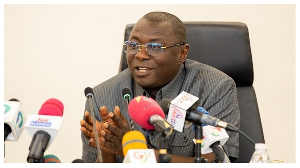Takoradi, May 16, 2005 (Chronicle) -- The western regional minister, Hon. Joseph Boahen Aidoo has stated that the government is losing billions of cedis each passing day because monies that should have come to national coffers as revenue are rather landing in private pockets.
According to him, the situation has arisen because Ghanaians had not developed the culture of collecting their receipts on taxable goods they buy from the market, especially those that have VAT elements in them. He therefore called on all Ghanaians to assist the government to block this leaking hole by insisting on their receipt anytime thy buy goods or commodities that had VAT element in them.
The regional minister who was speaking at the annual forum of the Takoradi Polytechnic chapter of TESCON in Takoradi yesterday, said failure to collect receipt would mean that money that should have come to the national coffers as revenue to develop the country is unaccounted for since there is no record.
Hon. Aidoo further told the well-attended forum, which was under the theme, The management of Ghana?s economy- its positive impact on the polytechnic education that all these revenues were being lost at the time Ghanaians were also crying for development in their respective areas.
Touching on the commotion surrounding the recent increase in petroleum products, the minister said the issue had arisen because some Ghanaians are not prepared to pay taxes for the needed development of the country.
He declared: ?We have not imposed taxes on the petroleum products to strangle Ghanaians. Every tax element in the new petrol price has its genuine cause.?
Aidoo noted that those who are complaining about payment of taxes usually go to church to pay their contributions, but when it came to what they must pay to the government as Jesus himself directed, they complain.
Boahen Aidoo told the students that noise making would not help the party secure the needed votes. He noted that it was road construction that would give the party all the votes that it wanted, therefore they would concentrate on that sector.
The government spokesman on finance, Nana Ohene Ntow, on his part, said the NPP government had helped stabilize the economy at the macro level and worked in reducing inflation access to loans easier from the banks. He regretted that upon all these achievements, the opponents of the government, particularly the National Democratic Congress (N DC) had been going round saying the government had done nothing because the so-called achievement had not reflected in the pockets of Ghanaians. Ohene Ntow further told the cheering students that $400 million out of the $600 million government shares in the then AGC which was sold by the NDC government could not be traced. He noted that the same party today had the courage to tell the whole world that the NPP government was a corrupt one. He regretted that some NPP supporters were also buying this idea that the government was indeed corrupt.
According to him, Ghana had been declared by an international agency as the safest place to send money to, in the whole world. He noted that this credit did not come on a silver platter but through good governance and good economic policies.
He was therefore surprised about the corruption tag being put on the government.
He assured the students and Ghanaians as a whole that through the deregulation policy that had been introduced by the government, pricing of petroleum products would be well managed and controlled as was prevailing in the current pricing of electricity and water.
He called on the students to ignore all the noise being made by the opposition because countries like Nigeria, USA, and Britain among others that produced petrol, pay taxes on oil. ?So what about we Ghanaians who do not produce petrol,? he asked.
Ohene Ntow noted that polytechnics in the country had seen some massive transformation in their infrastructural development through the HIPC initiative and $15 million loan sourced from the Spanish government.
All these, he continued, pointed
Mr. Eric Bruce-Amartey, president of the T?poly TESCON Said, they had played their role for the sustenance of the party, having gone out on outreach programmes in almost all the constituencies in the region.
General News of Monday, 16 May 2005
Source: Chronicle
















